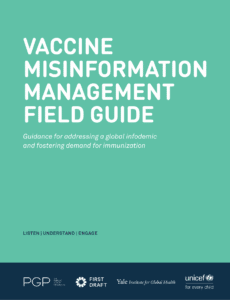Misinformation Alerts
Knowing what misinformation is being shared can help you generate effective messaging.
These insights are based on a combination of automated media monitoring and manual review by public health data analysts. Media data are publicly available data from many sources, such as social media, broadcast television, newspapers and magazines, news websites, online video, blogs, and more. Analysts from the Public Good Projects triangulate this data along with other data from fact checking organizations and investigative sources to provide an accurate, but not exhaustive, list of currently circulating misinformation.
Misinformation Alerts
Knowing what misinformation is being shared can help you generate effective messaging.
These insights are based on a combination of automated media monitoring and manual review by public health data analysts. Media data are publicly available data from many sources, such as social media, broadcast television, newspapers and magazines, news websites, online video, blogs, and more. Analysts from the Public Good Projects triangulate this data along with other data from fact checking organizations and investigative sources to provide an accurate, but not exhaustive, list of currently circulating misinformation.Alerts are categorized as high, medium, and low risk.
- High risk alerts: Narratives with widespread circulation across communities, high engagement, exponential velocity, and a high potential to impact health decisions. Are often more memorable than accurate information.
- Medium risk alerts: Narratives that are circulating in priority populations and pose some threat to health. Potential for further spread due to the tactics used or because of predicted velocity. Often highlights the questions and concerns of people.
- Low risk alerts: Narratives that are limited in reach, don’t impact your community, or lack the qualities necessary for future spread. May indicate information gaps, confusion, or concerns.
A viral story misrepresents Dr. Fauci’s vaccine safety comments from a March 2020 interview to claim that the now approved and authorized COVID-19 vaccines are making the pandemic worse. In the 21-month-old interview, Dr. Fauci talked about how some previous vaccines have made individuals more likely to get infected. His remarks were in reference to vaccines that did not go through clinical trials and were not vaccines for COVID-19, but have been taken out of context and are now being used to spread skepticism around COVID-19 vaccine safety and effectiveness.
Recommendation: Myths continue to circulate that vaccines can make people more susceptible to COVID-19 infection. The vaccines have been, and continue to be, tested to make sure that they are safe and that they prevent or reduce the severity of illness. Continuing to debunk these conspiracy theories and emphasizing the safety of the vaccines is recommended. Fact Checking Source(s): 
A trending article falsely claims that Pfizer and Moderna COVID-19 vaccines dramatically increase heart risks, including that of heart attack. This claim is based on an abstract published in the journal Circulation in November. Since then, the publisher has issued an “expression of concern” to warn that the abstract lacks sufficient data and may be unreliable, but the abstract has already been widely used to spread misinformation and stoke fears about the vaccines. There is currently no credible evidence showing that mRNA vaccines increase the risk of heart attack in any population.
Recommendation: Myths connecting COVID-19 to AIDS are continuing to spread online. Updating materials to debunk claims about HIV and the COVID-19 vaccines is recommended, as is monitoring local conversations about so-called “VAIDS.” Fact Checking Source(s): 
On a popular podcast, a physician known for spreading COVID-19 and vaccine misinformation falsely claimed that vaccines are not safe or effective and promoted “natural immunity” and alternative treatments as superior. Clips from the show have racked up millions of views on social media. Vaccines are our best protection against COVID-19, dramatically reducing the risk of severe illness and death. “Natural immunity,” or immunity gained from infection, is less predictable than vaccine immunity and can only be gained by risking serious illness and exposing others to COVID-19.
Recommendation: There is widespread confusion over whether “natural” immunity is better or worse than vaccine-derived immunity. Reiterating that the only safe way to acquire immunity is through vaccination, that infection-derived immunity is unpredictable, and that alternative treatments have not been shown to work against COVID-19, is recommended. Helpful talking points can be found here. Fact-Checking Source(s): 
Some social media users are claiming that the rising number of COVID-19 cases, despite high vaccination rates in certain areas, is proof that vaccines and vaccine mandates don’t work. Others argue that unvaccinated people are being treated unfairly because the vaccinated can also contract COVID-19. But vaccinated people are at a lower risk of contracting the virus and spreading it compared to unvaccinated people. Even against Omicron, which appears to be able to partially evade current vaccines, vaccinated people are far less likely to get seriously ill or need hospitalization.
Recommendation: The spread of Omicron has led to an increase in misinformation about the efficacy of vaccines against the variant. Emphasizing that COVID-19 vaccines remain the best form of protection against the virus and that unvaccinated people are at a higher risk from the virus is recommended. Fact Checking Source(s): 
The NYC Department of Transportation announced that an unauthorized bus stop ad has been removed for spreading disinformation. The ad, which mimics the appearance of the New York Department of Health’s “10 Reasons to Get Vaccinated” poster, makes multiple false claims, including that COVID-19 vaccines are dangerous, cause pregnancy complications, and cause new variants. COVID-19 vaccines are safe, as evidenced by the fact that 80 percent of NYC residents, including more than half of all children ages 5 and up, have received at least one vaccine dose.
Recommendation: Responding to each piece of misinformation may detract from priority talking points. Fact Checking Source(s): 
Social media users are using a preprint, non-peer reviewed study to falsely claim that Pfizer and Moderna COVID-19 vaccines make people more vulnerable to infection with Omicron. Viral posts also claim that the public was lied to and that the vaccine does nothing to stop the spread of COVID-19. While it’s true that our current vaccines are less effective against Omicron, they still offer some protection, especially against serious illness and hospitalization. Studies have also shown that a third or “booster” dose offers significant protection against the new variant.
Recommendation: The spread of Omicron has led to an increase in misinformation about the efficacy of vaccines against the variant and the public is understandably confused. Emphasizing that COVID-19 vaccines remain the best form of protection against the virus and that unvaccinated people are at a higher risk from the virus is recommended. Emphasizing that booster doses can increase protection against Omicron for those already vaccinated is also recommended. Fact Checking Source(s): 
A trending article falsely claims that Pfizer and Moderna COVID-19 vaccines dramatically increase heart risks, including that of heart attack. This claim is based on an abstract published in the journal Circulation in November. Since then, the publisher has issued an “expression of concern” to warn that the abstract lacks sufficient data and may be unreliable, but the abstract has already been widely used to spread misinformation and stoke fears about the vaccines. There is currently no credible evidence showing that mRNA vaccines increase the risk of heart attack in any population.
Recommendation: A small number of cases of heart inflammation in teens and young adults following COVID-19 vaccination has caused widespread misinformation online. Although responding to each piece of misinformation may detract from priority talking points, ensuring that informational and educational materials address these concerns is recommended. Fact Checking Source(s): 
A social media post falsely claims that an article warning that cold weather can increase the risk of blood clots and heart attacks is being used to cover up COVID-19 vaccine side effects. Experts have warned patients for years about a link between colder temperatures and an increase in heart issues and the formation of blood clots.
Recommendation: Responding to each piece of misinformation may detract from priority talking points. Fact Checking Source(s): 
A former reporter known for promoting vaccine misinformation published a blog post claiming that vaccinated people under 60 are dying at twice the rate of their unvaccinated counterparts. According to the post, the supposed "vaccine-caused mortality" was reported by the U.K. government earlier this year. But the data does not support his claims. The age-adjusted COVID-19 death risk was 32 times higher in unvaccinated people than in fully-vaccinated people. In the 10-to-59 age group, the all-cause death rate was higher because the vaccinated population skews older than the unvaccinated population, a result of older adults being prioritized in early vaccination efforts. Older adults obviously have higher death rates than younger adults and adolescents.
Recommendation: Wild, completely unverified myths that vaccinated people are dying more often than the unvaccinated continue to circulate online. Continuing to debunk these conspiracy theories and emphasizing the safety of the vaccines is recommended. Fact Checking Source(s): 
A news article currently making the rounds on social media falsely claims that a Pfizer report shows that the risk of death after receiving the Pfizer COVID-19 vaccine is one in 17. The article originated in New Zealand and has since made its way across multiple social platforms worldwide. The Pfizer report analyzed data only from people who reported adverse events that occurred after vaccination and not necessarily because of the vaccine. The report found that among people who reported adverse events—a tiny fraction of the millions who had been vaccinated—around one in 17 died.
Recommendation: There is considerable confusion over VAERS and other self-reported adverse vaccine tracking systems. In addition, anti-vaccine groups, conspiracy groups, and individuals practicing armchair epidemiology use this information in inappropriate ways. Public health talking points should continue to regularly promote vaccines and their safety and efficacy, and familiarity with systems like VAERS and Yellow Card is encouraged for public health communicators. Fact Checking Source(s): 
Alerts are categorized as high, medium, and low risk.
- High risk alerts: Narratives with widespread circulation across communities, high engagement, exponential velocity, and a high potential to impact health decisions. Are often more memorable than accurate information.
- Medium risk alerts: Narratives that are circulating in priority populations and pose some threat to health. Potential for further spread due to the tactics used or because of predicted velocity. Often highlights the questions and concerns of people.
- Low risk alerts: Narratives that are limited in reach, don’t impact your community, or lack the qualities necessary for future spread. May indicate information gaps, confusion, or concerns.
Vaccine Misinformation Guide
Get practical tips for addressing misinformation in this new guide. Click image to download, or see highlights.

